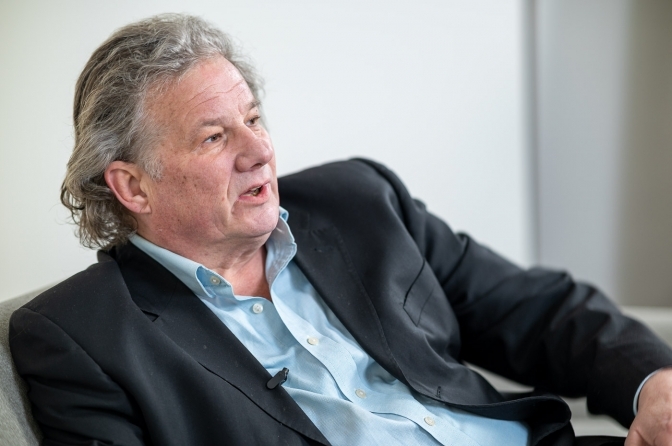
photo by tvoe misto
[For daily insights from throughout Ukraine, follow Ukrainian Freedom News on Telegram]
What was the reason that made you stay in Ukraine after 2014?
My blood is Ukrainian, and I feel I’m at home here even though I had a comfortable life in Canada. But when I came here specifically for the Maidan revolution - and I’ve been coming here for over 30 years - I realized something. I hit my head and I said: «Oh my gosh, I am Ukrainian.»
So, you've been living in Ukraine for 10 years.
Yes,10 years in Ukraine, and over 2 years here in Lviv.
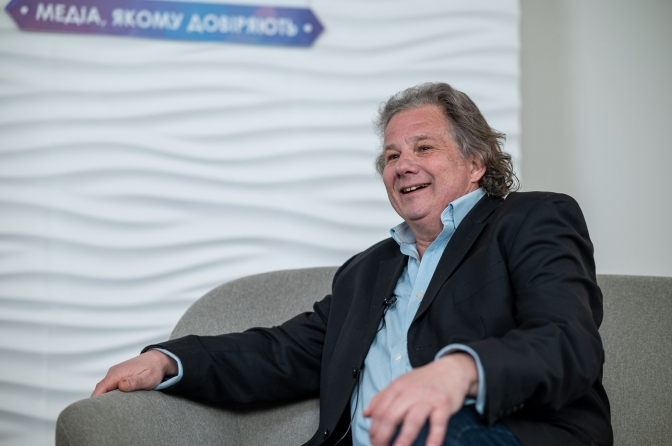
Yuri, we decided to have this conversation with you as your new book has just been published and everyone can find it on Amazon. One of the first articles in your book was published before the invasion, you wrote that if Russia invades, Ukraine ultimately wins.
It was almost the same message we came up with in February 2022 in our English language newspaper where we said: «We Will Resist. Five Reasons Why Ukrainians Will Win». We came up with that title because we met so many foreign journalists and international organizations, people and diplomats who stayed in Lviv for a week or more before the invasion. And we saw that they didn’t believe in Ukraine that much. Why were you so firm in your statement?
I wrote an article saying that if Russia invades, Ukraine will win simply because I believed that Ukrainians, especially the Maidan generation, would no longer tolerate the oppression of the authoritarian system represented by Russia in the context of the «russkiy mir» [Russian world]. I felt it because of the fact that I moved around the country. I didn’t spend all my time with people who were Western-oriented, but I felt that Ukrainians were ready to fulfil their historic destiny and would actually fight for their freedom. I felt that all across Ukraine, in the villages and in the cities. I was convinced, contrary to the intelligence and the assumptions of Western nations, that people of the Maidan generation were prepared to stay and fight against the evil of Russian authoritarianism. I felt that that there was no way they would give up and not fight for their freedom. A lot of people did not believe it. I did, and I wrote about it.
Why do you think people did not believe? And probably, there are still some in the world...
When I was here during the Maidan, I realised that historically, Ukrainians finally saw the opportunity to stand against the morality of «russkiy mir» and Russian values and they took it. Their fight was against corruption. The actions then taken by the Ukrainian government was a «moralna obraza» [moral offense]. I felt that people in this generation were offended by the morality of the system in Ukraine under the influence of Russia. People were offended by that and said: «That’s enough, we don’t want this.» It took a little while to understand what the cost would be. They thought: we have this revolution, we get rid of Yanukovych, and we will fight the Russians (when they invaded originally in 2014). I felt that people were ready.
From a moral point of view, we were offended and didn’t want to stand it. Having talked to ambassadors, I don’t think that Western diplomats and governments understood the depth and the determination of Ukrainians not to live under the values of «russkiy mir». I felt that. You could see that on the streets, in bars and restaurants, it was talked about in villages. And that’s the conclusion I came to. Of course, many now know that Ukrainians are very stubborn, and that they are resilient. It wasn't their courage that shocked me, but the resilience and stubbornness of the Ukrainian spirit. I knew that it’s been suppressed for so long, and I knew that here was the opportunity. The Maidan generation said: «We want freedom» in simple, definitive terms.
Does it mean that to understand Ukraine, you need to come and live here for much longer?
Of course, you have to stay. And what affected me was the fact that Ukraine is a very nuanced country. People here are highly educated and politically aware. But if you stay here long enough, you will know to what extent they believe in freedom. We want to live by the rule of law. We want truth, we want justice. We want to have the opportunity to pursue our economic ambitions.
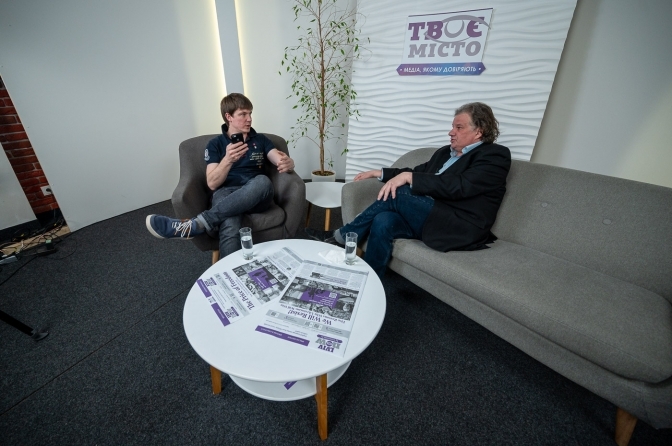
For example, when Covid hit, people were breaking down barriers to come back to be with their families. They wanted to be together. Many people don’t know the depth of their belief in family, in family values, and in the desire to be together. I wouldn't have known this depth unless I lived here. We don’t know it until we live here and listen to mothers and grandmothers talking about their children and how they want a better life for them. You don’t know the depth of it unless you travel and live here. This is a very nuanced place.
Thank you. «Dispatches Amidst the Sirens and Bombs» – that’s the title of your book. What is the dominant idea of the book? Is it to illustrate how the Ukrainian narrative was changing?
There are two types of writers. There are ones who focus on trees, and there are those writers who focus on the forest. What I very quickly realised is that the purpose and the inspiration for the articles was that I wanted to get across and establish in the Western mind what the true Ukrainian narrative really is. These are the people who, number one, have finally rejected the remnants of both Soviet and Russian authoritarianism and tyranny; second, people here wanted freedom.
I wanted to show people that this is a battle worth supporting Ukrainians because it is essentially a war of values and dignity. To make this narrative known and for it to be solidified in the minds of the West, of politicians and people. I wanted for it to be known that here is a country that wants to build a “culture of dignity”, with the rule of law, individual responsibility, economic ambition, and justice as main values. I wanted to get across the idea that even though it is a fledgling democracy, Ukraine did not, in any way, want to be under Russia’s sphere of influence. People must understand that Ukraine is not Russia, it is not a “small Russia”. But Ukraine’s narrative must start from this fact and in understanding that Ukraine is a unique culture, in possession of a specific language, literature, and art and that its values system is totally contrary to Russia. I wanted to get across this specific narrative so that people would really understand the real Ukraine and who would begin to change their assumptions and minds if they were open to it. That’s the purpose of the book, for sure.
Do you think there are still many people whose minds have to be changed? And how do you see the Russian propaganda narratives still working?
Within the informational sphere, Russian leadership is preoccupied with disinformation and propaganda. They are constantly trying to maintain and influence the informational field. Does this continue? Yes. Is this as strong as it used to be? No, and I’ll tell you why. Because when you judge a people or a society, you should not focus on what they say, but on what they do. For example, when Lavrov was in India at the G20 a month ago and he blamed Ukraine for starting the war, people started laughing. Their rhetorical reasoning has become a joke. Even in Ukrainian society, they have gone beyond normal fears of Putin, of what he can do and so on. By his actions, they see the true picture.
Russia, allegedly, had the second strongest army in the world. However, from the beginning of the war, it was almost virtually deadlocked with Ukraine’s army. It did not fulfil its immediate strategic objective to decapitate the Ukrainian government. Their main objective was, and is, to ruin Ukraine. But Ukraine has stood strong with the help of its Western partners to overcome all Russia’s fear mongering and terrorist tactics. So based on Russian behaviour during the war and seeing what’s really going on in Ukraine, with the practice of genocide and the committing of war crimes, people have begun to see the true nature of Russia.
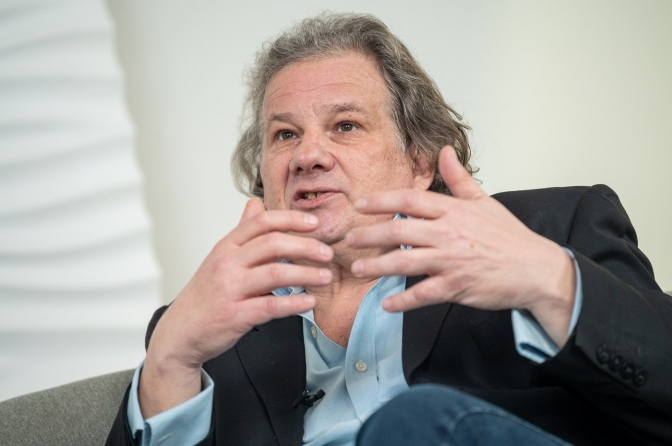
Now, as to whether people want to change their minds about Russia? They have to admit that they were wrong about Russia. I strongly believe that you can’t pursue a foreign policy believing that Russia is going to change if we somehow talk to them about democratic values. Russia has not shown that it has the ability to change. It is not governed by any sense of the rule of law. It is essentially an authoritarian system that does not respect the dignity of human beings.The war in Ukraine has only expanded the notion of the true nature of Russia. The use of propaganda cannot and will not alter the true reality that it represents.
Recently, there was a statement by the European Commission president who, speaking to President Zelenskyi, said that between now and Ukraine’s bright future, there may be a hard road to tread. And then, there was a reaction of many European politicians and intellectuals, explaining that this might be not the right way to act in such circumstances. And that Europe has also to care about those agents of Russia who have been supported for decades and influenced different policies. What do you think about it?
I’ll answer your question with a question. Can you see any type of relationship with a foreign power, Russia, whose strategic objective is to destroy and ruin their neighbour? Do you see a relationship with another nation, Russia, that does not respect international borders? Number three, can you find ways in which to relate to Russia when you clearly see they have no respect for human dignity? Four, are you prepared to have a relationship with a country that has committed war crimes and is using genocide to obtain its strategic war aims?
Some Europeans suggest that over 60,000 war crimes have taken place in Ukraine at the hands of Russian forces. Do you want to have a relationship with a country that behaves in such a way in a European country? What would be the nature of a proper relationship? I believe that for the time being, you have to break away and isolate this country simply because they don’t have any basis or parallel belief in certain fundamental human values. You can’t have normal relations with a country that behaves in such a way. You certainly cannot have a “just” peace. So my view is that it is time to isolate Russia. And yes, this should be in the form of judgment and punishment. When over 200 Ukrainian athletes have been killed, how can you go to the Olympics and allow a nation to participate whose policy is the destruction of humans and the destruction of another nation? Morally, you can’t justify that. Russia, in some form, will exist, and you’ve got to have some type of relationship with them. But ask yourself the question: do they deserve to be in the company of civilized people and those who aspire to live according to the rule of law?
And lead the Security Council, even for a month?
That’s a joke. Is there any other word for it? I mean this with all due disrespect. How can you have a nation with such a record of behavior in a position of leadership within an institution specifically organized to maintain international order? Its farcical. But it shows the fact we forgotten how to deal with this genocidal country that’s committed a criminal act of war through aggression. Are we saying that it’s going to be business as usual with Russia? This is cancer on the body politic of the world. And if we continue business as usual, we’re making, in the most simple of terms, a deal with the devil. Yes, it’s a little bit more complicated than that, but you’re dealing with somebody who is clearly at cross purposes with the rest of the world and international order. We need to restore a greater sense of a just international order. I think that Ukraine and the West are showing that it is essential, and in their direct interests to maintain a rules-based order. That’s why the West is supporting Ukraine, because to have order, you have to follow the law. The Russians don’t want to follow the law, they have values that prevent them from following it. I don’t even think that they even want to. So, what do you do with such a nation in present circumstances? You set them aside and isolate them.
Do you see how it may be achieved?
Sure. I think you can do things such as limit Russia’s participation in international fora. You have to show that you believe in those particular values. And if you don’t, the West must be prepared to say we’re going to stand in judgment of you and of your society, and to say that we are no longer going to respect you because you don’t follow these particular rules and norms.That’s what the war is about. It’s for a rule-based order. And it’s about these rules and the international law, that is the basis for security. You cannot tell me like the Kissinger realists say: «Oh, you know, we don’t want to punish Russia». And Macron says the same thing. We don’t want to punish Russia because it will cause instability and be needless humiliation.
I would argue the point, that this war with Russia, proves the fact that Russia is unstable. It is causing instability in the world. It has unleashed inflationary pressures and fears regarding fuel and energy security. So that country is the cause of instability as opposed to stability. And that’s how the world has changed and is changing. What is happening here in Ukraine is because of the courage and resilience of the Ukrainian people to stand up to Russian authoritarianism. Ukraine is a change agent. What they’re doing is reaffirming the principles of international order, of a definition of freedom and what free and dignity-based societies are. This is what they are doing: talking, defining, and redefining freedom and reiterating the importance of principles of dignity, the rule of law that are the basis of a stable and prosperous society that focuses on the betterment of its citizens.
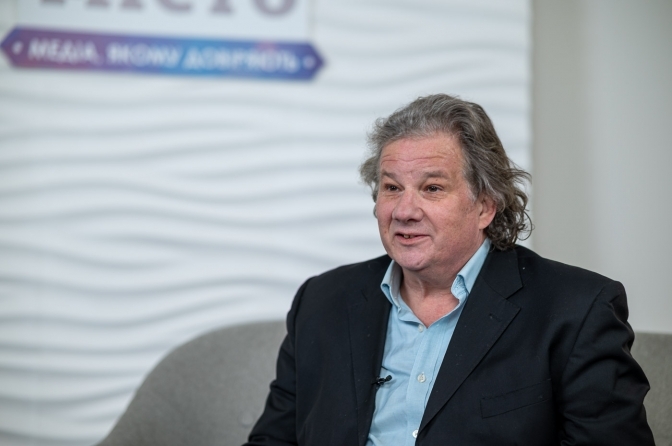
Well, I’ve told you on which basis to isolate and let them think about what kind of country they want. I don’t care about what happens in Russia. I don’t think about Putin that often. I know that what they’re doing and what you see in their behaviour in Ukraine, is a basis for them not to participate in international organizations or events.
Don’t you think about the fear in the West of this isolation of Russia and of the consequences that it might turn into even a worse monster than it is? Can it prevent making it really isolated?
I would say there are two important points I want to make. You used the word «fear». I talked to friends in December who were talking about the fear that Russia was going to use nuclear weapons. This is a reaction of an animal. Russia wants to terrorize and that’s what they’ve done here. Through their tactics and sending rockets into residential areas, they forced people to hide and live in basements like scared animals. Well, you know what? We are successful here in Ukraine because we no longer fear. And secondly, I’m just sick and tired of people always in a position of reacting to what Russia is doing.
Well, something I don’t want is to react to an authoritarian. I believe in democracy and freedom, and leadership stems from the fact that you’re not reacting, but you are leading. And so the example and what Ukraine has done, it’s affected people to say that freedom is worth fighting for. In Ukraine, we’re leading, meaning that we don’t want to talk about responding or reacting to Russia. But we are saying we want to lead out of belief in positive things about freedom, economic prosperity, and justice. These are the things we have to be talking about. And say to Russia: «Listen, if you want to be part of this international community – okay, but these are the rules of the world order. We’ve had enough of you trying to undermine this order for your selfish power gains and undermining the set of rules of how we live in freedom societies». So freedom means that I’m going to take the initiative to lead and not react. And this is what we have to show Russia.
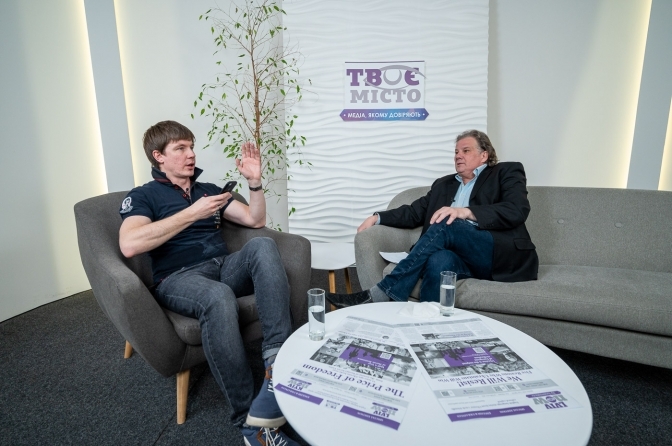
I remember my personal conversations with different people from all over the world in the early days of the invasion and even before. It was quite hard to explain the meaning of the word Gopnik. It’s not like gangsters, but hooligans from the nineties who will behave extremely badly unless they get a punch in the nose. Do you think the world should do something like that?
One of the key things facing democratic leaders is for them to be able to define what it means to win. Maybe rhetorically, you may not want to use that term, but here’s one thing that is a truism here in this region of the world which I only learned while I lived here. Here people punch first and talk later. I’ve seen situations where guys have tried to show their power or strength and attempt to dominate by beating somebody up. When the other guy responds with power or strength and doesn’t back down – then there is a kind of equality of positions.
Now, to your question. There was an assumption that the gambler Putin made. He felt – okay, we’re going to hit them, so they will back off. But the reaction of Ukraine has caused people to go crazy because they weren’t expecting Ukrainians to respond with such courage. Ukrainians were saying: «You know what, even though we may be smaller and we may not have the same strength militarily, we’re going to stand up to you. Because we’re not willing to submit to your coercion and your abuse of power». And that’s a big lesson of this war. The fact that Ukraine has stood up, in partnership with the military weapons of their Western partners, and said: «We’re not going to be victims of the Gopniks who punch us in the face and make us back off».
Not only Russia wasn’t expecting this: the United States wasn’t expecting it either. Both thought that in three or four days, we would lose. What did the Americans say to President Zelenskyi? We’ll give you a ride. We’ll get your family out. And you know his response? «I need ammunition. I don’t need a ride». And whatever ones politics may be, whether they be a Poroshenko supporter or Zelenskyi supporter, what he said and his attitude, crystallized in the mind of Ukrainians that we are going to resist and no longer allow ourselves to be subject to such an oppressive course of power. That’s an important lesson.
People who’ve gone to Yale or Harvard haven’t been in a fight in a very long time. And they don’t realize that here, if you show weakness, they’re going to take advantage of you. Because Putin only understands the use of power and its effect on people, and he wants to scare them. That’s why he bombs residential areas. Because when you’re afraid and you’re treated like an animal, to protect yourself, you’re going to hide.
In Lviv and around the whole country, when two months ago, there was an air raid siren and the Russians were trying to freeze us out, I asked a few 13-year-old girls whether they were afraid. And they answered, laughing: «No, are you?» What people have to understand is that in Ukraine, Putin doesn’t scare 13-year-old girls. And that is one of the best examples of the courage and resilience of the Ukrainian people against the use of coercive power. And that’s what Ukraine is teaching the world: «Don’t be afraid».
Exactly. Let’s hope that the world will not be afraid and we’ll have great leaders globally who will understand this and act as effectively as possible. And that we all know that victory is heading here, but we need to do as much as possible, everyone in his place.
Ukraine is providing a moral and life example of what it means to stand up for the dignity of human beings. Though they’ve had troubles in the last number of years on the road towards democracy, this is a war for its existence, and western peoples should understand this. It’s not a geopolitical, territorial war. This is a war that defines what kind of order you want in society. If you want fear, if you want abuse and coercive power, disrespect for neighbours and for law – Russia’s there for you. But if you want a higher sense of moral and democratic order that respects individual choice, freedom of thought and in word, rule of law and the importance of building a dignity-based society – then you’re with Ukraine. And I think that they’ve proven that.
This is a fight, a conflagration between orders, authoritarian, tyrannical order, and one that believes in a culture of dignity. This is what the war is about. That’s what I tried to do in this book «Dispatches amidst the sirens and the bombs». I had to find the time between the blackouts to write. This is the narrative that I want to get across, that this is a people that are not afraid. Yes, some are afraid, of course. But there are people here that stayed, they’re fighting and sacrificing their lives for freedom.
I’m speaking out to a foreign audience. But one of the things that Ukrainians have learned, while going through this process of war, is that they are being threatened existentially. At the same time, they’re trying to define what it means to live in freedom and to have freedom. And they’re learning that. People have got to remember that Ukraine was part of the Soviet sphere, and that the mentality of Homo Sovietus permeated this society. But this is now a society and a generation that says: «No, we don’t want that. We want a new sense of order.» And the world is supporting that, its Western partners realize that. That’s the part I wanted to contribute to the narrative. I wanted people in America and Germany, in England to think: «What is Ukraine? Who are they as a people?» I want to illustrate that Ukrainians are a people who are on this existential quest to build a culture of dignity.
Unfortunately, they live with a neighbour that wants to destroy them. Nonetheless, they want to define for themselves what it means to live in freedom. That’s the purpose of the book. Every article has that underlying theme, the importance of the dignity of the individual, and the importance of the rule of law. That the world can’t stand by and watch genocide and crimes being committed here that will not be accounted for, or for which no one will take responsibility.
We are not a country where we will, from now on, allow foreign interlopers, whether Russians, at the present time, or Germans during the Second World War, to come onto our land with aggression. The new Ukrainian attitude is this: that if you come to our land as guests, we will welcome you. We’ll eat and drink with you. But if you come with evil intentions, we will resist you and we will kill you. Ukraine is not a war society, actually they’re peace lovers. But now they finally said that you come on our land – we will kill you. Unfortunately, that’s a lesson that had to be learned. They want to work with the democracies. They want to be part of the democratic family. Ukrainians have earned the right to become part of the EU. They want to follow the laws. They want to trade. We are a bread basket. We want to feed. We take responsibility to feed hundreds of millions of people. And so this is what they’re fighting for.
And making really many goods or cultural products.
I think people should realize that Ukraine has influenced literature, painting, music, and laws. By the way, where was the term genocide invented? By somebody who’s from Lviv? [Rafael Lemkin - ed.] This is what we can contribute. This is a highly educated society. This is a definition of the greatest generation here in Ukraine, one who fights, Soldiers that are: artists, athletes, entrepreneurs, and professors, because they understand what the war is really about and are willing to fight. We’ve lost unbelievable talent. But this is a generation that is willing to do that. And I want people to realize and to read about that. What type of people will do this? And I want that story to be known. That’s the narrative. You have people here who will work, who have courage, who are resilient and who want to participate in a democratic family.That is the future of a society of educated people who are ready to work with their Western partners. And that’s what the fight is about.
You just reminded me of my meeting last night with my good friend who just came back from the trenches two days ago. He’s been there for more than a year and just came for a very short vacation with his family. He’s a paramedic, and he brought a dog that he saved in Bukhmut. He showed me what the dog was almost a year ago and how it looks now after being with him there for some time and also living here with his family. He owned a wonderful, important private company here helping people with their diseases. But now, he’s doing his duty. So that only shows what you were talking about.
What I found here is that two things have happened in a post-Soviet society. One is the ability and desire to serve. Many have left, but most of the people we know, a lot of entrepreneurs, are serving and raising money. They are getting stuff to the front lines, sending food and so on. The other thing is sacrifice. People have lost enormous amounts of revenue. Many have lost their homes. They can’t go back home because the Russians hit the residential areas. They have nowhere to go. But yet they stay. Many from eastern Ukraine come here, to the west of the country because it’s a little bit quieter. People have made a number of sacrifices, but are committed to service.
These are the values that are going to be the basis for the transformation and the rebuilding of a prosperous Ukraine. One main challenge is to not to bring people back into government that were still believers in the «russkiy mir». People have got to ask: «What did you do during the war?». I wait for the leadership that has now been fighting in ATO [Anti-Terrorist Operation - Ukraine's military resistance to Russia's invading forces since 2014] and who now fight on the front lines, to mature into societal leaders. They are majors and colonels and ordinary soldiers. I wait for them to take some time to readjust the society after the war. I’m waiting for them to have a good rest and then I expect them to go and build a just society for which they are fighting for. I tell them, even before they go, that I’m here to write about them. But they’ve got to come back and be the leaders of this society. Ukrainians no longer want a selfish oligarchical society, but a society that’s based on fundamental values and principles - democratic, even Christian, if you will.
That’s the Maidan generation, the 45 year olds and under. I say to people – look what they’ve done. That’s the narrative that I want to get across. So I don’t talk about Russia. Russia is a death society attempting to impose it’s death culture through war. Ukraine is a culture of dignity and life. And so, even though we’re experiencing great losses, there is an element of hope. I often greet people asking: «Are you from Ukraine?» Yeah, but they say it with a smile, even though they are in the middle of a war. That’s the pride that has arisen here taken because they are people here who are willing to die and live according to these principles. That’s what the West is supporting and that’s what I write about. I admit I’m not objective - I’m a full supporter of Ukraine. And that’s the purpose of the book. I want you to know what type of people are here fighting for those principles of freedom and defining freedom for a new generation.
Every journalist and every writer may not be absolutely neutral because you have to tell the truth. At least that’s what journalists are expected to do. And I think that is what you’re writing. You’re telling the truth.
I try to do that. I try to tell the truth because I have a firm belief in that. There’s a biblical principle in the New Testament that has greatly influenced me. It says that if you continue and you seek the truth, you’ll be free. And that’s also what we’re doing. Journalists should write about the truth, and you can see the truth of the war through the actions of the Ukrainian people. This is what the world’s got to know, and that’s why I write about Bucha. That’s why I write about genocide. That’s why I use the word evil. These are terms that a secular West has forgotten. But they know what freedom is and they see there is no other way. We are not in a Nietzschean world beyond good and evil. There is evil here. Ruination, killing, destruction. This is the basis for the definition of evil. And what Ukraine’s doing is resisting evil. They’re saying: «We’re going to resist and stand up against it». I think it’s worth supporting people like that.
Taras Yatsenko spoke
Text by Vitalii Holich, photo by Tvoe Misto
Follow us on Facebook and Instagram. Lviv Now is an English-language website for Lviv, Ukraine’s «tech-friendly cultural hub.» It is produced by Tvoe Misto («Your City») media-hub, which also hosts regular problem-solving public forums to benefit the city and its people.












